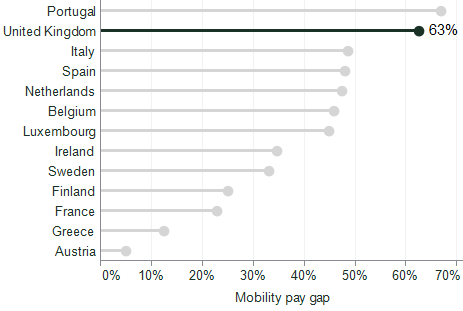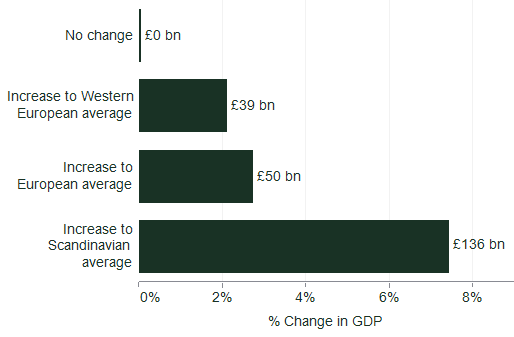Hidden talent: the economic benefits of social mobility
Scaling the ladder: the economic benefits of social mobility.
Social mobility is widely considered to be intrinsically good. Decoupling an individual’s prospects from their social status or family background is a key pillar of fairness and social justice. While this perspective has filled philosophy textbooks and opinion columns, what is less well understood is the role that social mobility plays in boosting productivity and economic output. This was the focus of Oxera’s latest pro-bono project, undertaken for the Sutton Trust, a charity seeking to increase social mobility through educational opportunity.
The UK suffers from low social mobility
Social mobility can be defined as ‘how someone’s adult outcomes relate to their circumstances as a child’.1 In a socially mobile society, an individual’s prospects are unrelated to their family background, while, at the other extreme, some education and employment opportunities in a socially immobile society may be open to individuals from only certain backgrounds.
One way to measure this social mobility is to compare the income of individuals whose fathers completed tertiary education with the income of those whose fathers did not complete upper-secondary school. The difference in income between these two groups can be considered a ‘mobility pay gap’, an indicator of how much an individual’s pay is influenced by this aspect of their family background. This could be driven by schooling, social networks, innate ability or any other way that a parent influences their child’s prospects. We would expect this gap to be smaller in a society where outcomes are not closely linked to family background, and larger in a society where this matters more. These figures are for males specifically (see chart below)—and the results are stark.
Figure 1 How much more income does an (male) individual earn if their father had a university education?

Source: Oxera analysis using data from OECD (2010), ‘A Family Affair: Intergenerational Social Mobility across OECD Countries’, p. 188.
The UK mobility pay gap is substantial. Based on this data, individuals with a tertiary-educated father earn 63% more on average than those whose father did not complete upper-secondary school. This gap is particularly large if we compare it to that of other European countries such as Ireland, France and Greece, where the gap is less than 40%. In this sample, only Portugal had a larger mobility pay gap than the UK.
Improving social mobility can boost economic output…
Our research found that increasing social mobility is more than just a matter of social justice. Creating the opportunity for talent across the social spectrum to be recognised, developed and utilised can improve productivity. This is primarily because, in a society where education and employment opportunities are largely determined by an individual’s family background (rather than their innate abilities), people are unlikely to be well matched to jobs (as some talent is underutilised). As employees whose skills match their jobs are likely to be more productive than those who are less well suited, socially mobile societies are likely to be more productive. Figure 2 illustrates this: the best candidate (in the red jacket) is not fully visible in a socially immobile society (because they have perhaps been filtered out through some part of the application process or did not put themselves forward for the job in the first place).
Figure 2 In a socially immobile society, the best match for a job might not be fully visible

Oxera tested this hypothesis using data from a range of European countries on social mobility, job matching (measured as the match between the education of an employee and the ‘appropriate’ level of education for that post) and productivity. We found that more socially mobile countries do indeed have a workforce better matched to jobs and a higher level of productivity.
… by more than 2%
Even a modest increase in the UK’s social mobility—for example, raising social mobility to the average of Western European countries—could increase gross domestic product (in the long term) by around 2%, through better job matching. This is equivalent to £39bn per year in today’s prices. Improving social mobility further—to the average across all European countries—could lead to an even more substantial increase of £50bn. This improvement is not instant; it takes time for policies that increase social mobility to translate into improved job matching. But once achieved, it is permanent.
Our estimate focuses only on the link between social mobility and productivity related to job matching. The prize is likely to be much larger if we account for other ways in which social mobility influences productivity.
Figure 3 Raising social mobility to the Western European average could increase GDP by over 2%

Social mobility matters. Decoupling opportunity and upbringing can unlock the latent potential of high-aptitude individuals, enabling them to generate greater value in the economy. At a time when the UK is facing a productivity challenge, improving social mobility is not a question just of equity, it is an economic imperative.
Oxera’s full report for the Sutton Trust is available on our website. The project is part of a programme of pro-bono economics undertaken by Oxera. Earlier work includes analysis of the economics of befriending and the impact of early intervention in cases of homelessness.
1 The Sutton Trust (2017), ‘About us: Social Mobility’, accessed 12 July 2017.
Download
Related

Economics of the Data Act: part 1
As electronic sensors, processing power and storage have become cheaper, a growing number of connected IoT (internet of things) devices are collecting and processing data in our homes and businesses. The purpose of the EU’s Data Act is to define the rights to access and use data generated by… Read More

Adding value with a portfolio approach to funding reduction
Budgets for capital projects are coming under pressure as funding is not being maintained in real price terms. The response from portfolio managers has been to cancel or postpone future projects or slow the pace of ongoing projects. If this is undertaken on an individual project level, it could lead… Read More

